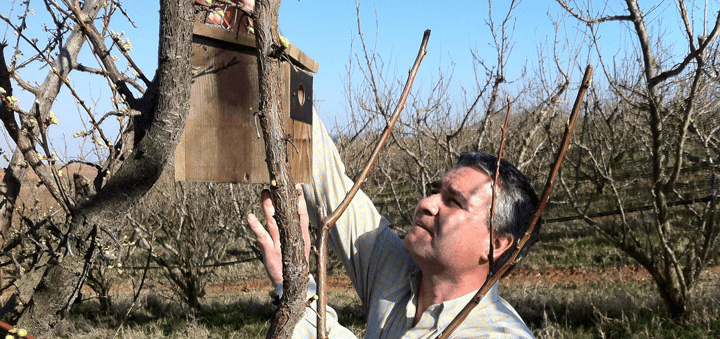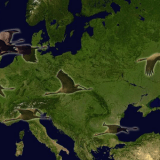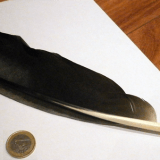Can the Great Tit replace chemical pesticides? That’s what the International Foundation for the Rehabilitation of Ecosystems (FIRE by its Spanish initials) is trying to do with its strategic ecological restoration project “Campos de Vida”. FIRE has placed nest boxes in three Spanish provinces in order to study the potential of the Great Tit and other insectivorous birds as biological pesticides. The aim is to increase the bird population in study areas in order to analyse how they can protect woody crops from several agricultural pests.
A total of 211 nest boxes have been placed in Badajoz, in the stone fruit tree plantations “Concejiles” and “El Chaparrito”, exploited by the company Haciendas Bio. In Valladolid, 164 nest boxes have been placed in the perimeter of the vineyards of the Abadía Retuerta winery; in Ciudad Real, a total of 75 nest boxes have been placed in three olive groves in Campo de Montiel. Moreover, they have planted hedges and built little ponds so the new insectivorous bird populations can settle permanently. In January 2013 all the boxes were placed and, little by little, they were occupied by their new residents: the European Crested Tit, the opportunistic Eurasian Tree Sparrow, the Coal Tit and, specially, the Great Tit.
The first results obtained in the 200 vineyard hectares of the Abadía Retuerta plantation are very promising. As the months pass, the controls carried out prove that the number of caterpillars hunted by the birds increases in 50 % in the vineyards where there are nest boxes. Each Great Tit couple, along with its offspring, consumes about 27 kilos of invertebrates every year. As a whole, the new inhabitants of the 200 vineyard hectares of the Abadía Retuerta winery consume more than a ton of invertebrates, protecting the plantation from the feared grapevine moth and saving between 3000 and 4000 euros per year in chemical treatments. Another benefit of avian plague control is the increase in the quality of the wines, as no chemical pesticides are used over the vineyards.
The initiative Campos de Vida proves that avian biological control of crop pests, like the olive fly, the fruit fly, the red spider, the earwig or the grapevine moth, is possible in woody crops. However, there is still a long way ahead before we can see chemical pesticides eradicated by our little tits, but FIRE has achieved an essential milestone proving that it is viable and, moreover, economically profitable.












